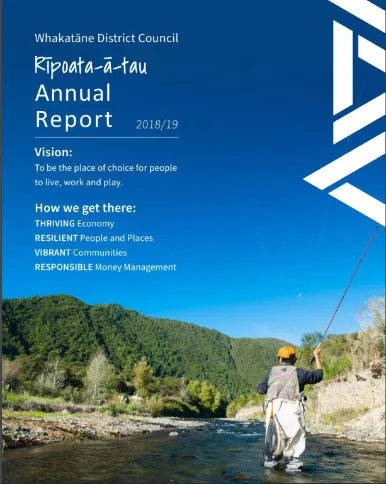The new Whakatāne District Council adopted the audited Annual Report for the 2018/19 financial year at an extraordinary meeting held on 31 October 2019. The Annual Report covers all aspects of the Council’s financial management, plus 92 non-financial performance measures, and is a requirement of the Local Government Act 2002.
Mayor Judy Turner says the overall performance of the Council for the past year is positive, in terms of both financial and non-financial measures. “The services Council delivered achieved 78% of our targets, which is an improvement from the previous financial year,” Mayor Turner says. “Of those not achieved, more than one-third were within five percent of their target, and I believe that is an accomplishment we can be proud of. I would like to acknowledge the elected members from the last triennium that led the charge for this result.”
Mayor Turner also says that total revenue and expenditure was within one percent of budget, an accurate representation of the Council’s disciplined approach to financial management. The final operating expenditure for 2018/19 included a surplus of $12.7 million, compared to a budgeted surplus of $13 million. The main reason for the variance is that Council received $4.4 million less in subsidies and grants than budgeted, with the largest contributing factor incomplete and under-budget roading works related to storm damage.
Key projects undertaken within the previous financial year included: the Whakatāne Regeneration Programme, which progressed with a $646,000 grant from the central government Provincial Growth Fund; installation of new public conveniences in Te Teko and Murupara; development of a Destination Management Plan; upgrades to the Whakatāne Airport, Whakatāne Aquatic Centre and Port Ōhope Wharf; and the opening of Te Whare Taonga o Taketake, the Whakatāne District Museum and Research Centre.
Mayor Turner says that Council is always mindful of the need to balance rates affordability with the significant amount of work and investment that needs to be done to create resilient and thriving communities. “The Annual Report presents an excellent opportunity to reflect on what has been achieved throughout the year while remaining financially sustainable,” she says. “A healthy surplus will ensure we are prepared for the costly infrastructure developments required within the three waters portfolio in the future. Also, the nature of our work is extremely multi-faceted and this document captures exactly what has been achieved by our staff.”
